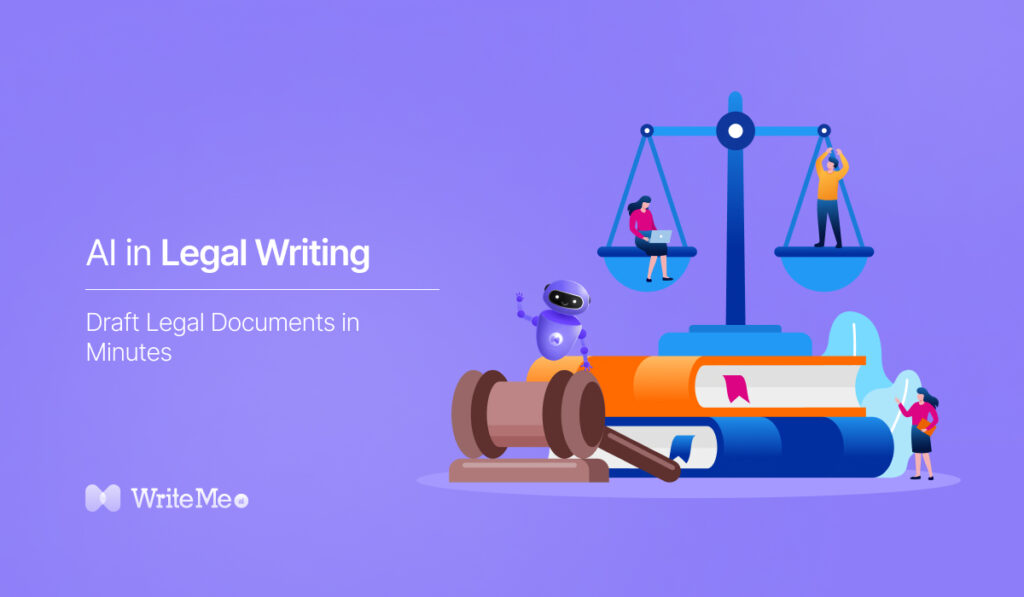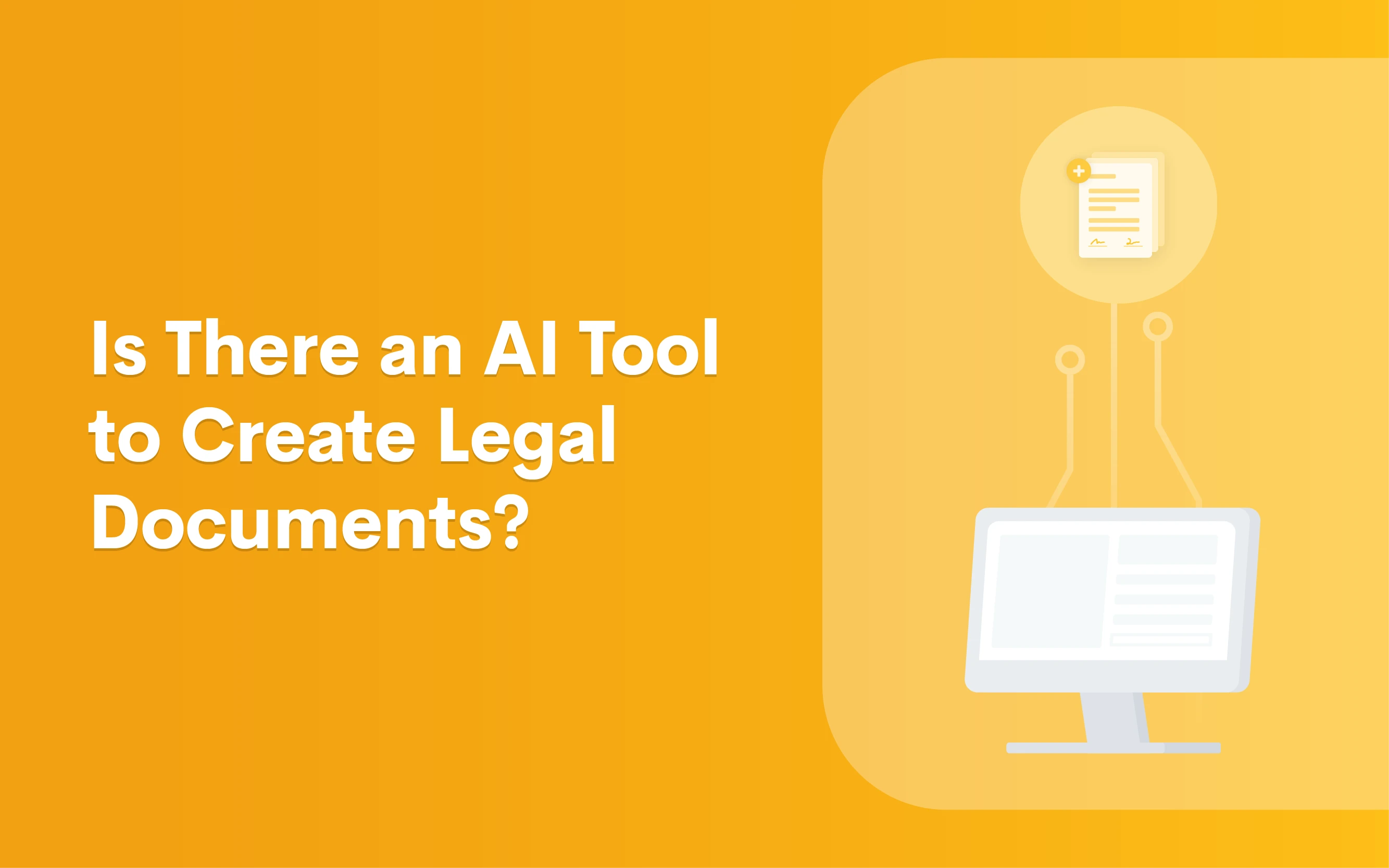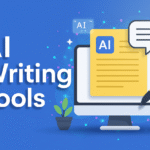Have you ever found yourself buried under a mountain of legal paperwork, wishing for an easier way out? Legal documents can be daunting, often filled with jargon and complexities that make them hard to navigate.
But what if there was a way to simplify the process, saving you time and stress? Imagine a tool that could draft these documents for you with precision and efficiency. Enter the world of artificial intelligence. Can AI really handle the intricacies of writing a legal document?
You might be surprised by what technology can accomplish today. Dive into this exploration to uncover how AI might just revolutionize the way you handle legal paperwork, potentially transforming your legal tasks from a headache into a breeze.

Credit: writeme.ai
The Role Of Ai In Legal Writing
Artificial Intelligence is transforming many fields, including legal writing. The ability of AI to analyze data and produce documents is impressive. Law firms now explore AI tools for drafting legal documents. But how effective is AI in this realm? This section uncovers the role of AI in legal writing.
The Rise Of Ai In Legal Writing
AI’s presence in legal writing grows rapidly. Lawyers use AI to automate repetitive tasks. This saves time and reduces errors. AI helps in drafting contracts and reviewing documents. It can handle large volumes of data quickly. The rise of AI in legal writing continues to evolve.
Benefits Of Ai In Legal Writing
AI offers many benefits in legal writing. It speeds up the document creation process. AI ensures consistency in legal terms. It reduces human error and increases accuracy. Lawyers can focus on complex tasks as AI handles routine work.
Challenges Of Using Ai In Legal Writing
Despite its advantages, AI faces challenges in legal writing. Understanding context is one issue. AI might miss nuances in legal language. Ethical concerns arise from AI’s decisions. Ensuring AI doesn’t replace human judgment is crucial. These challenges require careful consideration.
Future Of Ai In Legal Writing
The future of AI in legal writing is promising. AI tools will become more sophisticated. They might understand legal context better. This could lead to more accurate document creation. Collaboration between AI and lawyers is key. The legal industry must adapt to these changes.
Capabilities Of Ai In Drafting Legal Documents
AI technology has made strides in many fields, including law. It can now assist in drafting legal documents with speed and accuracy. The use of AI in legal drafting is transforming how lawyers work. Here, we explore the specific capabilities of AI in this domain.
Understanding Legal Language
AI can analyze and understand legal language effectively. It deciphers complex terminology quickly. This capability saves time for legal professionals. AI tools are trained with vast legal data. They grasp nuances in law language with ease.
Automating Repetitive Tasks
AI excels at automating repetitive legal drafting tasks. It can fill templates with client data swiftly. This automation reduces human error and increases efficiency. Lawyers can focus on more strategic work.
Generating Standard Contracts
AI can generate standard contracts like NDAs and leases. These documents follow pre-set patterns. AI uses these patterns to draft contracts consistently. This ensures compliance with legal standards.
Providing Legal Research Support
AI aids in legal research by sifting through large databases. It finds relevant cases and statutes quickly. This helps lawyers make informed decisions. AI’s research capability is a valuable asset in legal drafting.
Ensuring Consistency And Accuracy
AI ensures consistency across multiple legal documents. It checks for errors and inconsistencies. This results in more accurate legal drafting. Clients receive documents that are reliable and precise.
Enhancing Collaboration Among Legal Teams
AI tools enhance collaboration among legal team members. They allow seamless sharing and editing of documents. This fosters better communication and efficiency. Teams can work together on drafts in real-time.
Limitations Of Ai In Legal Contexts
AI can draft legal documents, but it faces challenges. Understanding complex legal nuances and ensuring accuracy remains difficult. Human expertise is crucial to interpret laws and provide context. AI lacks the ability to fully comprehend ethical considerations and human emotions involved in legal matters.
Artificial Intelligence (AI) is transforming how we approach tasks, including legal documentation. However, AI isn’t without its constraints, especially in legal contexts. While AI can quickly draft contracts or agreements, there are certain limitations that can impact the quality and reliability of these documents. As you explore AI’s role in legal documentation, understanding these limitations can help you make informed decisions about its use. ###
Understanding Legal Nuances
AI systems often struggle to grasp the nuanced language of legal documents. Legal terminology is complex, filled with jargon that requires precise understanding. These nuances can affect the interpretation and outcome of legal documents. Imagine reading a contract where a single word changes the entire meaning. AI might miss these subtle shifts, which could lead to serious legal consequences. Have you ever found yourself re-reading a sentence just to ensure you understand it correctly? AI may not have that luxury. ###
Contextual Awareness
AI lacks the ability to understand context in the way humans do. It doesn’t have the cognitive ability to interpret the subtleties of human intent and emotion. Legal documents often require contextual awareness that AI can’t provide. Consider a legal document addressing emotional distress. AI can draft the text, but it can’t truly comprehend the emotional weight behind the words. You know the importance of empathy in legal matters, but AI only understands data points. ###
Adapting To Changes
Laws and regulations are constantly evolving. AI needs regular updates to keep pace with these changes. However, AI might not adapt quickly enough to new legal standards or amendments. Have you ever encountered a law change that required immediate attention? AI might not catch these updates unless it’s programmed to do so. This could result in outdated or incorrect legal documents. ###
Reliability And Trust
AI can make mistakes, just like humans. While it’s programmed to minimize errors, there’s always a risk of inaccuracies. In legal contexts, even minor errors can have major implications. Would you trust a machine to handle a sensitive legal matter? Many people prefer human oversight to ensure accuracy and reliability. AI can assist, but human review is often necessary to guarantee trustworthiness. ### AI operates based on algorithms, which may not always align with ethical considerations. Legal documents often require ethical judgments that AI might overlook. Think about a situation requiring moral judgment. AI might not consider the ethical implications of its decisions. You might prefer human involvement in these scenarios to ensure ethical standards are met. ###
Final Thoughts
AI is a powerful tool, but it’s not without its limitations. You need to weigh the pros and cons before relying solely on AI for legal documents. While AI can enhance efficiency, human expertise remains crucial for ensuring accuracy, context, and ethical considerations. Would you trust AI with your next legal document, or would you prefer a human touch?
Comparison With Human Legal Professionals
Artificial Intelligence is making strides in various fields. One intriguing area is AI’s capability to draft legal documents. But how does AI stack up against human legal professionals? This comparison explores their strengths, limitations, and potential in the legal domain.
Efficiency And Speed
AI excels in processing tasks quickly. It can draft documents in minutes. Human lawyers, on the other hand, take longer due to manual research and analysis. AI’s speed can save time in straightforward legal tasks.
Accuracy And Error Rate
AI tools minimize errors by following set patterns. They lack the human oversight that catches nuanced mistakes. Human professionals often detect errors based on experience and context, which AI might miss.
Understanding Complex Contexts
AI struggles with complex legal contexts. It relies on pre-programmed data. Humans interpret subtle nuances and understand broader implications. This skill comes from years of study and practice.
Personalized Client Interaction
Human lawyers build relationships with clients. They provide personalized advice and support. AI lacks empathy and emotional intelligence, crucial in sensitive legal matters.
Cost Implications
AI can reduce legal costs by automating routine tasks. It offers a budget-friendly alternative for simple documents. Human services can be expensive due to expertise and time requirements.
Legal Expertise And Judgment
Human lawyers offer seasoned judgment and legal expertise. They adapt to changing laws and provide strategic advice. AI lacks this adaptability and depth of knowledge.
Reliability And Trust
Clients often trust human lawyers for critical legal issues. AI is reliable for basic tasks but lacks the trust factor for complex cases. Trust is built over years of human interaction.
Ethical Considerations
AI’s capability to draft legal documents raises ethical concerns. Accuracy and understanding are crucial in legal matters. Misinterpretation risks legal errors and misunderstandings. It’s essential to ensure AI respects privacy and confidentiality, safeguarding sensitive information. Balancing technology with human oversight is vital to maintain trust and legality in document creation.
When considering whether AI can write legal documents, ethical considerations are crucial. It’s not just about whether AI can do the job but whether it should. Legal documents carry significant weight and can impact lives. The ethical implications of AI in this domain are vast and complex.
Understanding Accountability
Who is accountable for errors in AI-generated legal documents? Unlike human lawyers, AI lacks personal responsibility. If an AI makes a mistake that leads to a legal misstep, the blame could fall on developers, users, or even the AI itself. This raises questions about trust and reliability. Are you ready to trust a machine with your legal affairs?
Confidentiality Concerns
Legal documents often contain sensitive information. AI systems need access to this data to function, which can lead to confidentiality issues. Protecting client privacy is paramount in legal practice. Would you feel comfortable knowing that an AI has access to your personal legal data?
Bias And Fairness
AI systems can inadvertently inherit biases from their training data. This can result in biased legal advice or document creation. Ensuring fairness in AI-generated legal documents is essential. Can an AI truly deliver justice if it’s not free from bias?
The Human Element
The human touch in legal practice is invaluable. Lawyers offer empathy, understanding, and nuanced judgment that AI currently lacks. While AI can draft documents, it can’t replace the experience and intuition of a seasoned legal professional. Do you think AI can ever fully replace the human element in law?
Access To Justice
On the flip side, AI has the potential to make legal services more accessible. It can help those who can’t afford traditional legal services by offering cheaper alternatives. This democratization of legal assistance is a positive outcome. Could AI be the key to making legal help available to everyone?
Continuous Learning And Adaptation
AI systems evolve based on new data and legal developments. However, they require constant monitoring and updates to ensure accuracy. The responsibility falls on developers and users to keep the AI system current. Are you prepared for the ongoing commitment to maintain an AI legal assistant? In the realm of legal document creation, AI introduces both opportunities and challenges. Ethical considerations are at the forefront of this evolution, prompting reflection on trust, responsibility, and the future of law. As you ponder these questions, consider the balance between innovation and ethical responsibility.
Future Prospects Of Ai In Law
The future of AI in law looks promising. AI continues to evolve and integrate into legal practices. This transformation opens new possibilities for efficiency and accuracy. AI tools can process vast amounts of legal data quickly. They offer insights that lawyers can use to make informed decisions. The potential for AI in law is vast, extending beyond simple tasks. Let’s explore how AI might shape the future of legal practice.
The Rise Of Ai-powered Legal Research
AI streamlines legal research with rapid data analysis. It sifts through cases, statutes, and regulations efficiently. Lawyers can find relevant information faster and with greater precision. This reduces research time and increases productivity. AI tools can identify patterns in legal documents. These insights help in predicting case outcomes.
Automating Routine Legal Tasks
AI automates repetitive tasks in legal work. Drafting contracts and managing documents become easier. This frees up time for lawyers to focus on complex tasks. Automation minimizes human error in routine processes. It enhances the accuracy and consistency of legal documents.
Ai In Legal Predictive Analytics
Predictive analytics powered by AI transforms legal strategy. AI analyzes past cases to forecast outcomes. This helps lawyers develop better strategies for their clients. It improves decision-making by providing data-driven insights. Lawyers gain a competitive edge with predictive analytics.
Ai And Improved Client Interaction
AI enhances client interaction in legal services. Chatbots offer quick responses to client queries. They provide 24/7 assistance, improving client satisfaction. AI tools can personalize client services based on data analysis. This leads to more tailored legal advice and solutions.
Ethical And Regulatory Considerations
The integration of AI raises ethical questions in law. Lawyers must ensure AI usage complies with regulations. There are concerns about data privacy and security. AI systems must be transparent and accountable. Legal professionals need to address these challenges responsibly.
The Role Of Ai In Legal Education
AI impacts legal education by providing new learning tools. Students use AI for research and case studies. This prepares them for AI-driven legal environments. AI offers simulations for practical legal training. It enhances the learning experience with interactive tools.
Case Studies And Real-world Applications
Exploring AI’s capability in drafting legal documents reveals interesting case studies. Real-world applications demonstrate AI’s efficiency, accuracy, and potential in legal document creation. Understanding these examples helps appreciate AI’s growing role in legal processes.
The question of whether AI can write a legal document is not just theoretical—it’s being tested in real-world scenarios. With advancements in natural language processing, AI tools are increasingly being used in the legal sector. Let’s dive into some fascinating case studies and applications that highlight how AI is reshaping legal documentation.
Case Study: Ai In Contract Drafting
AI is already making waves in contract drafting. Legal technology companies have developed AI software that helps lawyers create contracts faster and more accurately. These tools analyze existing contracts, identify common clauses, and suggest improvements. For instance, a law firm used AI to draft a complex commercial contract. The AI reviewed thousands of similar contracts to suggest optimal terms. This not only saved the lawyers valuable time but also reduced the chances of human error. Would you trust AI to draft your next business contract?
Real-world Application: Automating Legal Research
Legal research is another area where AI is proving invaluable. AI-powered tools can sift through millions of legal documents to find relevant information in seconds. This is a game-changer for legal professionals who often spend countless hours on research. A notable example is a legal startup that uses AI to perform legal research. Lawyers input specific queries, and the AI returns precise case laws and statutes. This enhances the lawyers’ ability to build strong legal arguments. How would faster legal research change your workflow?
Case Study: Ai In Will Writing
AI is also entering the personal legal document space, such as will writing. Companies are offering AI-driven platforms that guide users through creating a will. This technology is designed to make legal services more accessible to the general public. A user-friendly AI tool was utilized by a family to draft a will. The AI asked questions to understand their needs and generated a legally sound document. This process was not only cost-effective but also demystified the legal jargon for the family. Would you consider using AI to create your will?
Real-world Application: Ai In Legal Compliance
Ensuring compliance with ever-changing laws is a daunting task for businesses. AI solutions are assisting companies in staying compliant by monitoring legal changes and suggesting necessary document updates. One corporation used an AI system to manage compliance documents across multiple jurisdictions. The AI automatically flagged potential compliance issues and suggested amendments. This proactive approach reduced the risk of legal penalties. Could AI help your business stay ahead of compliance challenges? As these case studies and applications show, AI is not just a futuristic concept in the legal world. It’s actively being used to streamline processes and enhance accuracy. While the technology is not without its limitations, its potential to transform legal documentation is undeniable. How ready are you to embrace AI in your legal endeavors?

Credit: www.allaboutai.com

Credit: www.lawmatics.com
Frequently Asked Questions
Can Ai Draft Legal Contracts?
Yes, AI can draft legal contracts using advanced language models. These tools analyze legal data to create accurate documents. They offer efficiency and consistency, minimizing human error. However, human oversight is recommended to ensure compliance with specific legal requirements.
Is Ai Reliable For Legal Document Creation?
AI is generally reliable for creating legal documents. It uses databases and machine learning to ensure accuracy. Nevertheless, it’s crucial to have a legal professional review the final output for specific case nuances. This combination optimizes efficiency and precision.
Can Ai Understand Legal Terminology?
AI can understand legal terminology due to its programming. Advanced models are trained on vast legal datasets. They interpret complex language and adapt to different legal contexts. Despite its capabilities, human review remains essential for nuanced legal interpretation.
How Does Ai Ensure Document Compliance?
AI ensures document compliance by analyzing legal standards and regulations. It applies relevant rules to draft documents accurately. Regular updates to AI systems help maintain compliance with changing laws. Nonetheless, expert legal review is advisable for final verification.
Conclusion
AI can help draft legal documents, but it’s not flawless. Human oversight remains crucial for accuracy. Legal contexts vary and need careful consideration. AI tools improve efficiency but can’t replace human judgment. Lawyers understand nuances AI might miss. Trust AI for drafts, but verify details.
Legal expertise ensures compliance and precision. Technology aids, but human touch finalizes legal documents. Balance AI efficiency with human insight. Embrace technology, yet rely on expert review. Legal documents demand accuracy and context. Always involve professionals in legal processes. Keep exploring AI’s potential, but stay vigilant.
A collaborative approach enhances document quality and reliability.




